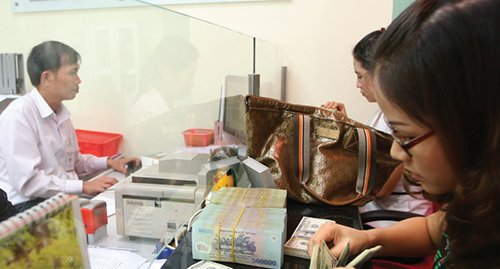SBV tweaks exchange rate to ease tensions

The State Bank (SBV) increased the exchange rate by 1 per cent for the first time since December, 2011 to VND21,036 per USD from VND20,828, effective from June 28, according to a statement on the central bank’s website.
This adjustment is intended to better reflect foreign currency supply and demand, thus stabilising the foreign exchange market. The SBV would take all necessary measures to guarantee exchange rate stability, said the statement.
The adjustment is also considered to be in line with the sharp depreciation in the currencies of emerging economies against the US dollar.
“After keeping the reference rate constant at 20,828 for 18 months, this devaluation is overdue and widely expected by investors,” said Alan Pham, chief economist at VinaCapital, a leading fund management company in Vietnam.
“The State Bank’s move was actually reactive, following market developments instead of leading them, because market rates had already reached 21,200 in the days before,” he said.
Pham Hong Hai, a managing director at HSBC, also said markets had been expecting the adjustment for several weeks when foreign currency demand and supply began showing signs of tension with higher demand and lower supply. In addition, he added, the exchange rate had been fixed for a long time which had raised expectations for an exchange rate adjustment.
Pham agreed with the policy move citing the support it gives to export companies. Exports are an important part of the country’s gross domestic product (GDP), and would help boost its growth, which was weak at 4.9 per cent in the first half of this year.
“We do not think this step will lead to a weakening of the Vietnam dong. The State Bank’s official reserves are at $30 billion and it can intervene in the forex market to support Vietnam’s currency. The overall balance of payments is expected to be in surplus. Other capital inflows like remittances, FDI disbursements and ODA loans will be stable and keep a positive current account balance as well,” Pham added.
Banking expert Nguyen Tri Hieu, however, held a different view. He argued that the depreciation of the Vietnam dong might be the State Bank’s own orientation rather than the result of mounting pressure from the market, “because imports have not put much pressure on the economy so far this year.”
Pham of VinaCapital noted that the change at 1 per cent was small and it was well within the 2-3 per cent limit of depreciation to which the State Bank is committed. “The SBV is likely to devalue the dong by 1 per cent in the fourth quarter of this year given that it still has room to do so.”
What the stars mean:
★ Poor ★ ★ Promising ★★★ Good ★★★★ Very good ★★★★★ Exceptional
Latest News
More News
- Cashless payments hit 28 times GDP in 2025 (February 04, 2026 | 18:09)
- SSIAM and DBJ launch Japan Vietnam Capital Fund (February 04, 2026 | 15:57)
- Banks target stronger profits, credit growth in 2026 (February 04, 2026 | 15:43)
- Vietnam on path to investment-grade rating (February 03, 2026 | 13:07)
- Consumer finance sector posts sharp profit growth (February 03, 2026 | 13:05)
- Insurance market building the next chapter of protection (February 02, 2026 | 11:16)
- NAB Innovation Centre underscores Vietnam’s appeal for tech investment (January 30, 2026 | 11:16)
- Vietnam strengthens public debt management with World Bank and IMF (January 30, 2026 | 11:00)
- Corporate bond market poised for stronger growth cycle (January 28, 2026 | 17:13)
- Vietnam's IPO market on recovery trajectory (January 28, 2026 | 17:04)
















 Mobile Version
Mobile Version